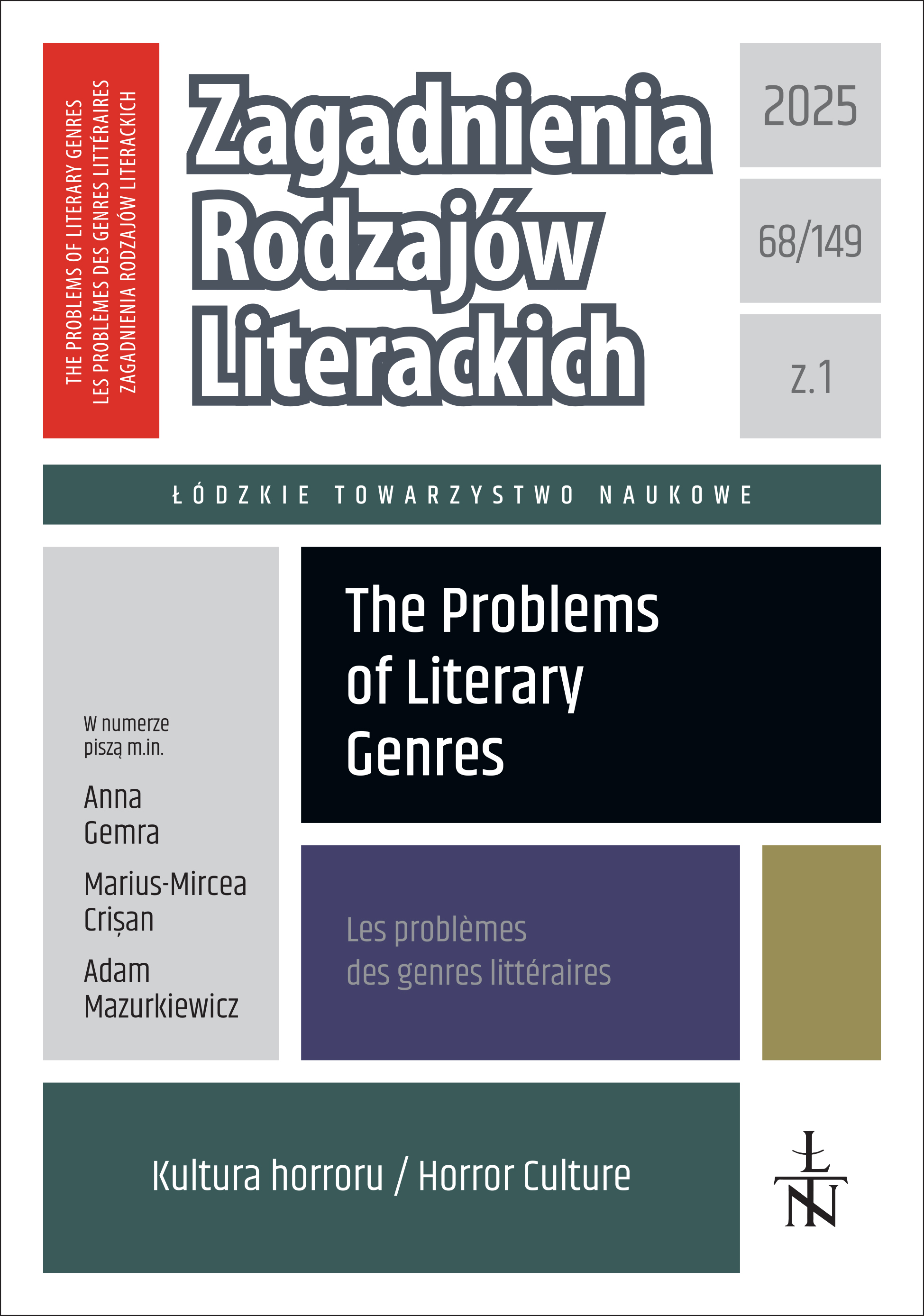Postkolonialne lęki w nawiedzonym domu. Motywy traumy i poszukiwania tożsamości w horrorze dla młodzieży "Nakarmię cię strachem" Trang Thanh Tran
DOI:
https://doi.org/10.26485/ZRL/2025/68.1/14Słowa kluczowe:
young adult horror fiction; haunted house; colonialism; colonial crimes; VietnamAbstrakt
The analysis presented in the article concerns the debut novel of young adult horror fiction entitled She Is a Haunting by Trang Thanh Tran. The interpretation of horror motifs in the novel is presented from the point of view of postcolonial studies. The plot of the novel centers on 17-year-old Jade Nguyen, who is an American of Vietnamese descent. The girl returns to her parents’ country to get money for college. She stays in an old house, which turns out to be haunted by ghosts. Jade begins her own investigation to unravel the mystery of the haunted house. She discovers the horrifying truth about the murderous activities of French colonizers in Vietnam. Tran uses the motif of horror to tell the story of the trauma of unrequited colonialism and the crimes associated with it. In addition, the book explores themes of the search for one’s own identity. The main story line is complemented by the contexts of historical and contemporary racism and the issue of migration and the Vietnamese diaspora in the United States. The text’s research questions revolve around the thematic symbiosis of horror with the postcolonial perspective (including in relation to young adult fiction literature): how does the novel address historical horror related to colonialism?; how can the creations of the haunted house and ghosts be interpreted in postcolonial terms? The article also presents the genre contexts of horror that appear on the pages of the novel. The analytical part of the text is preceded by a theoretical description, focusing on the relationship between young adult fiction and horror conventions.
Liczba pobrań
Bibliografia
Bhabha Homi K. (1988), The Location of Culture, Routledge, Londyn.
Bolf-Beliveau Laura (2018), Interpreting Horror Spaces [w:] Horror Literature and Dark Fantasy: Challenging Genres, red. M.A. Fabrizi, „Critical Literacy Teaching Series: Challenging Authors and Genres” t.10.
Buelow E. Melissa (2002), Trends, patterns, and characteristics of young adult horror fiction, University of Northern Iowa, Iowa.
Fee Margery (2025), Who Can Write as Other? [w:] The Postcolonial Studies Reader. Third Edition, red. B. Ashcroft, G. Gffiths, H. Tiffin, Routledge, Londyn–Nowy Jork.
Fein Helen (1999), Genocide and gender: The uses of women and group destiny, “Journal of Genocide Research”, t. 1.
Gomez Cristina Lledo (2022), Encountering Colonialism, „The Culture of Encounter Project”, 4 kwietnia, https://cultureofencounter.georgetown.edu/responses/encountering-colonialism [dostęp: 13.05.2025].
Has-Tokarz Anita (2011), Horror w literaturze współczesnej i filmie, Wydawnictwo Uniwersytetu Marii Curie-Skłodowskiej, Lublin.
Legendy wietnamskie (2017), t. 1 i t. 2, red. A. Krystowiak, N.Ch. Thuat, Wydawnictwo Rys, Poznań.
Moore Ryan (2019), „Rewriting the Rules:” Postcolonial Perspectives on Contemporary Young Adult Literature, „Augsburg Honors Review” t. 12.
Nadolna-Tłuczykont Marta (2017), Horror w literaturze dla dzieci i młodzieży: (na wybranych przykładach) [w:] Literatura dla dzieci i młodzieży, red. K. Tałuć, Wydawnictwo Uniwersytetu Śląskiego, Katowice.
Olszewski Wiesław (1991), Historia Wietnamu, Ossolineum, Wrocław–Warszawa–Kraków.
Pham Minh Chau Nguyen (2021), Resistance, Healing, and Ghostly Bodies in Diasporic Vietnamese Narratives, Norwegian University of Science and Technology, Faculty of Humanities, Department of Language and Literature, Trondheim.
Pulliam June (2010), Monstrous bodies: femininity and agency in Young Adult horror fiction, https://repository.lsu.edu/gradschool_dissertations/259 [dostęp: 13.05.2025] [rozprawa doktorska].
Said Edward (2024), Orientalizm, przeł. M. Wyrwas-Wiśniewska, Zysk i S-ka, Poznań.
Rydstrom Helle (2014), Politics of colonial violence: Gendered atrocities in Frenchoccupied Vietnam, „European Journal of Women’s Studies” t. 1.
Tałuć Katarzyna (2013), Horror w tekstach dla młodego odbiorcy (rekonesans badawczy) [w:] Nowe opisanie świata: literatura i sztuka dla dzieci i młodzieży w kręgach oddziaływań, red. B. Niesporek-Szamburska, Wydawnictwo Uniwersytetu Śląskiego, Katowice.
Thomson Jamie (2018), Dalat in the spotlight: 50 years after Tet offensive, an invasion of a different kind, „The Guardian”, 1 lutego, www.theguardian.com/cities/2018/feb/01/dalatspotlight-tourists-eternal-spring-vietnam-tet [dostęp: 13.05.2025].
Thuan Pham Duc, Thuan Tran Minh (2024), The first Indochina War (1946–1954) and the Geneva agreement (1954), „Cogent Arts & Humanities” t. 11, nr 1.
Tran Trang Thanh (2025), Nakarmię cię strachem, przeł. D. Górka, Wydawnictwo Kobiece, Białystok [wyd. oryg. 2023].
Young C. Robert (2025), The Cultural Politics of Hybridity [w:] The Postcolonial Studies Reader. Third Edition, red. B. Ashcroft, G. Gffiths, H. Tiffin, Routledge, Londyn–Nowy Jork.
Pobrania
Opublikowane
Wersje
- 2025-09-19 - (2)
- 2025-06-25 - (1)








